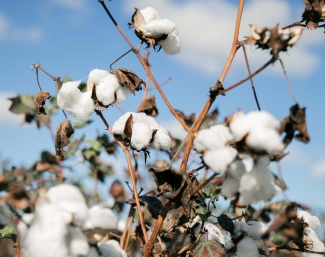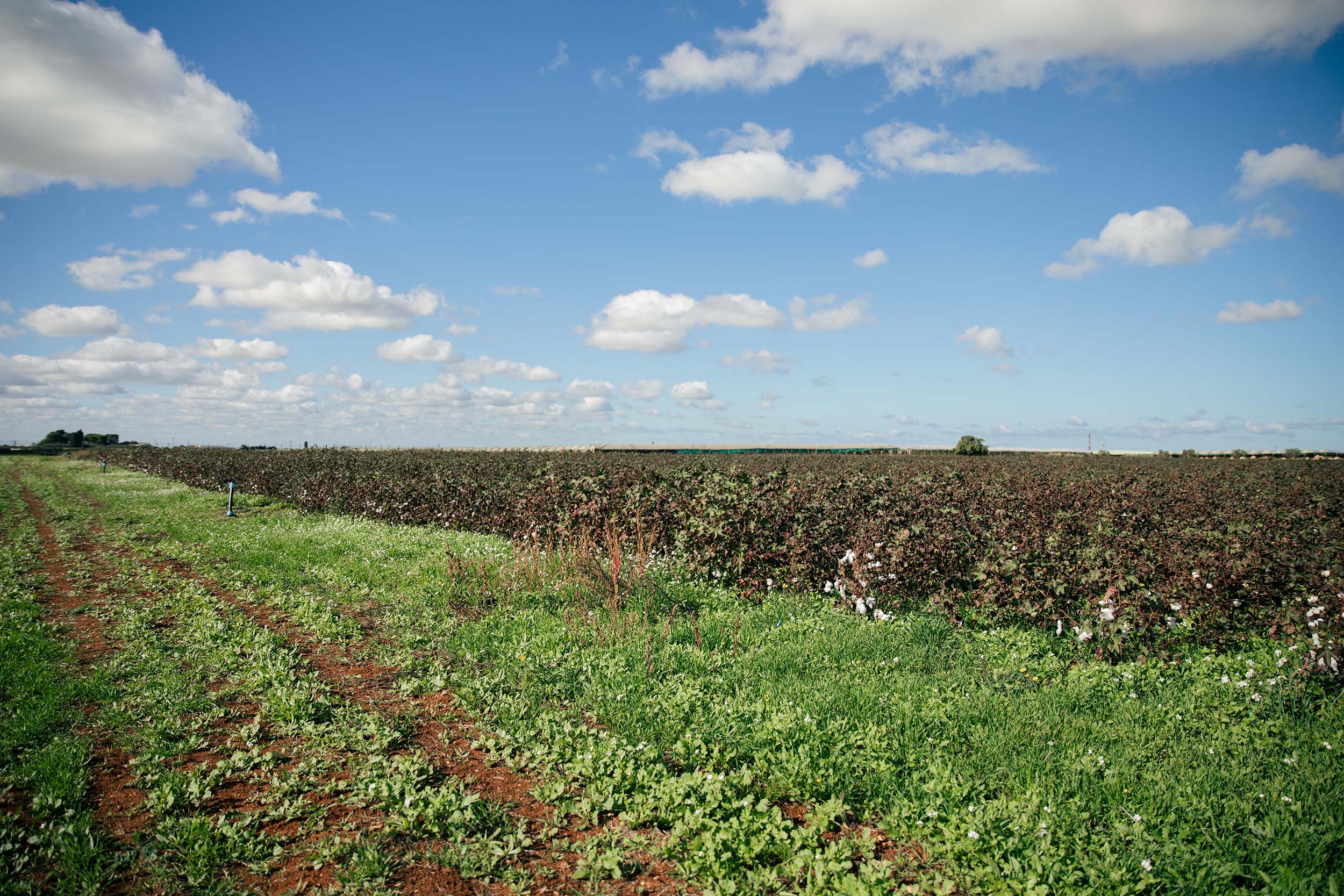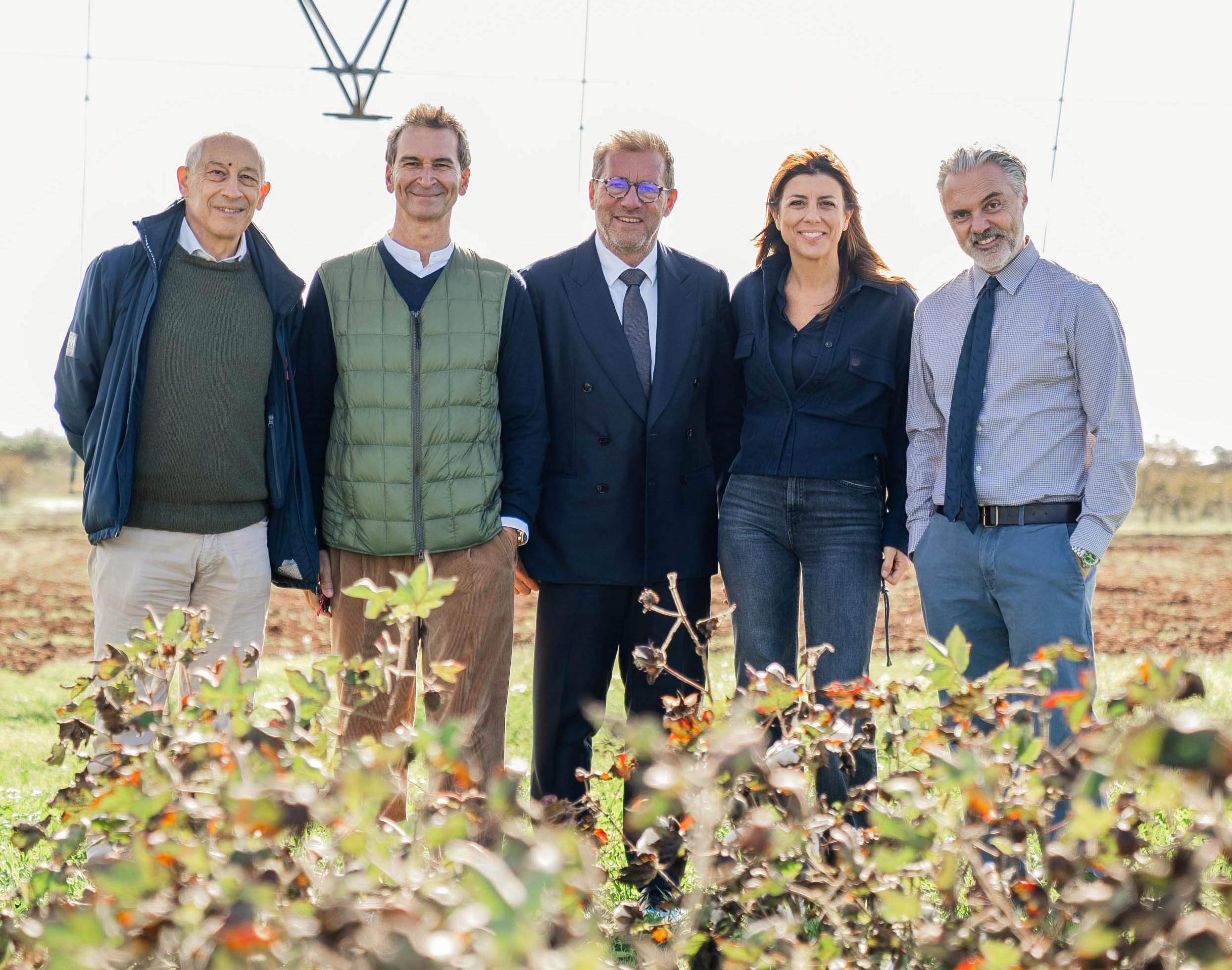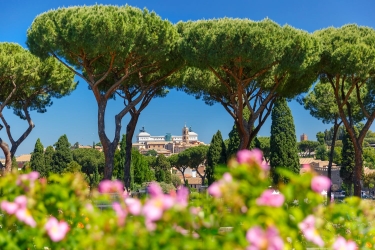First tangible results of the Apulia Regenerative Cotton Project

Launched in June 2023 in collaboration with the Armani Group, the Sustainable Markets Initiative Fashion Task Force and the Circular Bioeconomy Alliance, and coordinated by the European Forest Institute (EFI), in partnership with the Council for Agricultural Research and Economics of Italy (CREA) and PRETATERRA, the Apulia Regenerative Cotton Project was created to develop an experimental regenerative cotton site to test and scientifically assess sustainable cotton production through the application of regenerative agroforestry techniques in Italy.
Two years on, the project, which is probably the first field experiment in Europe testing agroforestry cotton with alternative tree species and regenerative practices, has already produced its first tangible results, marking an important step forward towards regenerative fashion and achieving its goals of regenerating soil, water and biodiversity.
"This project shows how scientists and fashion companies can work hand in hand to build a more local and sustainable value chain for certified regenerative cotton in Apulia”, explained Robert Mavsar, EFI Director.

Sowing
Following the first cotton plantation with rows of peach trees on 1 hectare of land in 2023, cultivation was gradually expanded the following year, integrating poplar and pomegranate trees, and covering a total of 3 hectares (0.6 ha in agroforestry and 2.4 ha in monoculture).
During the third year, cotton was sown alternately with rows of carob, fig and mulberry trees, totalling approximately 5.2 hectares (3.6 ha in agroforestry and 1.6 ha in monoculture). This expansion exceeded the initial five-year target of 5 hectares ahead of schedule.
Harvest
A total of 2,400 kg of regenerative cotton was harvested in the first year, and 3,000 kg in the second.
Scientific results
The experimental project has so far generated four scientific papers, published in leading international journals such as Agroforestry Systems, Journal of Environmental Management and Plants, following peer review by independent scientists. The studies explore topics including sustainable cotton production, carbon accumulation in soil through agroforestry and the application of artificial intelligence to optimise irrigation and water conservation.

The finished product
Another key milestone was the creation of the first garment made entirely from regenerative cotton, so-called because it derives from crops grown using agroforestry systems and agricultural practices that promote biodiversity conservation and carbon sequestration, while reducing emissions, chemical use and water consumption.
Approximately 1,000 T-shirts were produced with the cotton obtained from the first sowing. Made entirely from Regenagri-certified cotton, the T-shirts feature a QR code and digital passport to guarantee authenticity and traceability. Certification extends across the entire supply chain, ensuring full traceability of the product and its chain of custody. From cultivation and processing to weaving, manufacturing, packaging and sale, every supplier involved is audited to obtain Regenagri certification. Available in white and blue with the Giorgio Armani’s signature embroidered in the same colour, the men's T-shirts are on sale in selected Giorgio Armani boutiques in Europe (excluding the United Kingdom and Switzerland) and online in the same areas from July. The specially designed packaging is also made from recycled material.
Further information
For further information on the scientific aspects of the project: Livia Podestà, Communications Manager, European Forest Institute- Biocities Facility, Rome
Tel: +39 3406269610, livia.podesta@efi.int
For further information on the product: press@armanivalues.com
Download the press release in English or Italian
Photos: Federica Livia - Frigobar Production
About the European Forest Institute (EFI)
The European Forest Institute (EFI) is a pan-European international organization conducting scientific research and providing policy support on forest-related issues. EFI has 30 Member Countries and c.130 member organizations from 40 different countries working in diverse research fields. EFI has more than 25 years of experience in coordinating complex transnational scientific forest-related projects funded by the European Commission and Member States. EFI’s Biocities Facility in Rome, Italy, is a global reference in generating and communicating relevant scientific knowledge on the potential of the circular bioeconomy concept to rethink urban areas, particularly based on forest-based solutions. The Facility is a leader in developing a new and holistic conceptual framework for the use of green infrastructures and biobased solutions in urban environments, to tackle climate change and other global challenges. Increasingly relevant “urban” sectors and challenges such as building construction (e.g., the New European Bauhaus initiative), fashion, transport, food, packaging, waste and human health and wellbeing directly benefit from the knowledge and activities generated.
About the Armani Group
Founded in 1975 by Giorgio Armani, the Armani Group is among the world’s leading fashion and luxury companies. The Group designs, manufactures, distributes and directly retails fashion and lifestyle products, including apparel, accessories, eyewear, watches, jewellery, cosmetics, fragrances, furniture and home décor, and operates in the food, beverage and hospitality sectors.
About the Sustainable Markets Initiative (SMI)
In his former role as The Prince of Wales, His Majesty King Charles III launched the Sustainable Markets Initiative (SMI) in January 2020. The Sustainable Markets Initiative is a network of global CEOs working together to build prosperous and sustainable economies that generate long-term value through the balanced integration of natural, social, human and financial capital. In 2021, the SMI also launched its Terra Carta, which provides a roadmap for acceleration towards an ambitious and sustainable future; one that harnesses the power of nature and transformative action, alongside private-sector innovation and resources.
https://www.sustainable-markets.org
About the Circular Bioeconomy Alliance (CBA)
The Circular Bioeconomy Alliance was established in 2020 by His Majesty King Charles III (formerly The Prince of Wales) to connect the dots between finance, companies operating within biobased value chains and action on the ground to restore land, enhance biodiversity and provide jobs and prosperity to local and indigenous communities. Members include intergovernmental organisations, companies, investors, research organisations and NGOs that provide expertise and implement projects in areas related to the circular bioeconomy.
https://circularbioeconomyalliance.org
About the Council for Agricultural Research and Economics of Italy (CREA)
The Council for Agricultural Research and Economics of Italy is organised into 12 Research Centres located throughout the country. CREA-AA (Centre for Agriculture and Environment) conducts studies and research focused on the characterisation, sustainable management and spatiotemporal modelling of agricultural and forestry ecosystems through an inter- and multidisciplinary approach. The CREA-AA unit based in Bari (Apulia), which owns five experimental farms, is the consortium’s implementing partner. CREA-AA is responsible for the implementation, monitoring and scientific assessment of the experimental sites across the five hectares of the “M.E. Venezian Experimental Farm” in Rutigliano.
About PRETATERRA
PRETATERRA develops and implements regenerative and replicable agroforestry systems, combining scientific data, ancestral empirical knowledge and traditional wisdom with technological innovation. PRETATERRA contributes to the co-design of the agroforestry cotton experimental sites and the regenerative practices being tested.


